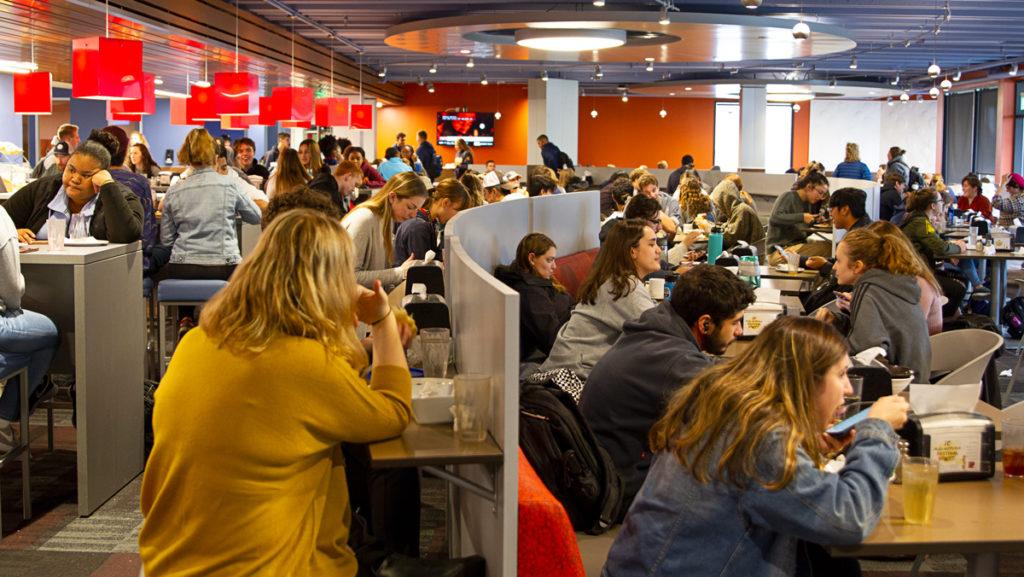Students and professors have partnered with Ithaca College Dining Services to study nutrition and the physical demands of working in the dining halls.
There are three collaborative projects between Ithaca College students and Dining Services. Julia Lapp, associate professor in the Department of Health Promotion and Physical Education, is working with students to rebuild the nutritional allergen database, which previously belonged to Sodexo, the college’s former food provider. Julie Dorsey, associate professor in the Department of Occupational Therapy, is leading a group of graduate students in the occupational therapy program to assess working conditions in the Campus Center Dining Hall. Joseph Ungco, assistant professor in the Department of Occupational Therapy, is working with a group of students to look at Dining Services from an overall organizational perspective.
The college announced last spring that it would end its contract with Sodexo. The plan to provide in-house dining services is tied to the strategic plan, Ithaca Forever. Dave Prunty, executive director of auxiliary services, said the main goals of in-house dining services were to reduce the cost of the meal plan, bring local businesses on campus and accommodate students who struggle with food insecurity. Prunty said Dining Services was also looking to get the campus community more involved with the development process.
“How do you make it more of an integrated part of the campus community?” Prunty said. “So are there opportunities to work especially with faculty to say there are these components of your curriculum that could be accentuated by working with dining to actually give students a hands-on experience?”
Students began working on the projects at the beginning of Fall 2019. Prunty said Dining Services hopes to work with students and expand on these projects throughout the academic year.
Prunty said one of the goals is to have students who are working on editing the nutritional menus and database available in the dining halls to provide nutritional information.
“Throughout the course of the fall and into the spring, the hope is to get them in IC gear and have them actually be visible in the dining halls during meal periods to actually answer questions and gather feedback from a nutrition kind of perspective, what people are looking for, especially as that database gets built,” Prunty said.
Graduate students in the occupational therapy program are working with Dorsey to assess ergonomic risks associated with repeated motions and regular duties in the dining halls, beginning with Campus Center. Dorsey said ergonomics, the study of people’s efficiency in their working environment, is important for everyone to consider in their everyday lives. Students are examining conditions at various work stations in Campus Center and studying how repeated motions and activities dining hall staff are asked to do could contribute to work-related injuries.
“We are not looking at specific employees but are rather taking a population approach by assessing the various job categories, cooks and food service workers, and looking broadly at the job demands and comparing this with what the ergonomics research tells us is the best practice for injury prevention,” Dorsey said.
The goal of this project is to have recommendations that can be implemented to support the employees and help them complete their jobs without risk of injury.
“This process is helping the students to learn about the food service industry within the context of IC and to learn how to make evidence–based recommendations to mitigate risk factors,” Dorsey said. “The Campus Center Dining Hall employees are doing amazing work in serving our community, and these recommendations will hopefully just enhance what they are already doing.”
Mindy Pasternak, fifth-year occupational therapy student, is one of the students involved in this project. Pasternak said ergonomics is an underappreciated field and one that can be difficult to understand for occupational therapy students.
“This initiative gives students a great opportunity to experience something nuanced in occupational therapy and also gives dining hall services great feedback from a population perspective on how they can better serve their hardworking employees,” Pasternak said.
Lapp helps run another project and said students are helping with data entry in the college’s menu database.
“They are adding information about allergens and nutrients for the hundreds of foods that Dining Services uses,” Lapp said. “In addition, they are also working on food and nutrition educational materials to be used in the dining rooms on a variety of topics, food waste, dietary choice and ecological impacts.”
Lapp said that in the future, she and the students plan to help with special events, tours and educational services related to dining services.
Sophomore Samantha Wheelwright is a public and community health major at the college working with Lapp on the nutritional data entry. Wheelwright works in Terrace Dining Hall to enter nutritional information about the meals offered, and she is also in the process of creating infographics to help educate students on how to make better food choices.
“Through this experience, I am learning more about healthy eating and the wide variety of options that are actually available but didn’t even know myself that existed,” Wheelwright said.








